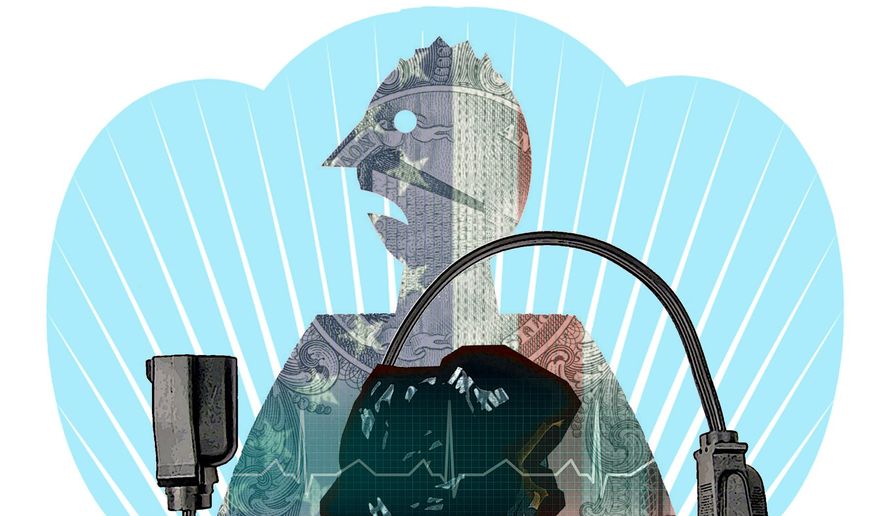OPINION:
It’s 9:46 p.m., and I’m sitting in a hospital 40 miles east of my hometown. My 61-year-old dad has been rushed to the emergency room for quadruple-bypass open-heart surgery. Dad’s currently undergoing a procedure called catheterization, which from my understanding is when doctors thread a tube through a blood vessel to your heart and scope things out for enzymes that are present only when the heart is under certain kinds of stress.
Everything here depends on electricity. Everywhere I look, there are flashing lights, monitors, ventilators, beeping noises, clicks, ticks and drips. Much of the information used by the nurses and doctors is displayed on computer monitors, from patient assignments for registered nurses to Dad’s medical history.
Unfortunately, the newly proposed rules from the U.S. Environmental Protection Agency (EPA) to limit carbon-dioxide emissions will make electricity much harder to come by and much more expensive. These rules, designed to limit coal use and promote renewable energy, will narrow our energy choices, increase costs and potentially limit our electricity supply. Increasing energy costs makes health care less affordable because hospitals require enormous amounts of energy.
Large hospitals (those more than 200,000 square feet) in the United States used 458 trillion British thermal units worth of energy in 2007. This is more energy than was used by the entire country of Ecuador.
I live in Wisconsin, where 62 percent of our electricity is generated by coal-fired power plants. The proposed EPA rules would require my state to cut carbon-dioxide emissions by about one-third, which portends devastating effects. In fact, the Wisconsin Public Service Commission warns the EPA’s approach “risks continued access to Wisconsin’s most reliable energy source and our ability to provide affordable energy to the citizens of Wisconsin.”
If the EPA shutters coal plants, natural gas is the most logical replacement because it is the most affordable. It emits just half of the carbon dioxide produced by burning coal, and the United States produces more of it than any other country in the world. The problem is, despite mountains of evidence demonstrating that hydraulic fracturing, also known as “fracking,” is conducted in an environmentally responsible way and poses no danger, environmentalists are trying to shut it down. Without fracking, we cannot produce enough natural gas to generate electricity for our homes, schools, and hospitals. Wind and solar — intermittent and very expensive alternatives — cannot replace that capacity.
Despite decades of subsidies to solar power and wind, they currently provide just one-tenth of 1 percent and 4 percent of our current energy demand, respectively. Additionally, wind turbines generate power only about 20 minutes of every hour, and electricity generated from wind power costs three to five times more than that from coal or natural gas.
Despite claims that wind and solar are “responsible” forms of renewable energy, replacing reliable and affordable sources such as coal and natural gas with expensive sources such as wind and solar — which often aren’t there when we need them most — is certainly not a “responsible” thing to do.
Many people don’t realize the extent to which EPA’s proposed rules will affect their lives. By reducing the diversity of our energy sources, the new rules will impose energy scarcity, and the resulting higher costs will raise the price for small businesses to keep the lights on and for children to do their homework. Carbon-based fuels do not “cost” our society; on the contrary, they make it possible. The proposed EPA regulations designed to promote “responsible” energy are downright dangerous.
When Dad is lying there in need of life-saving surgery at 2:06 a.m., I don’t want the surgeons to have to wait for the sun to come up or the wind to blow. I want them to operate as soon as they can. Fossil fuels make that happen, along with all the other great blessings of our modern world. President Obama’s new EPA rules would cast that all to the wind.
Isaac Orr is a research fellow for energy and environmental policy at the Heartland Institute.




Please read our comment policy before commenting.